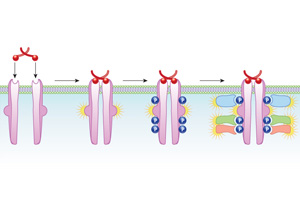Progress
Loading ...
Unit 4: How Do Cells Sense Their Environment?
- In This Unit
- Cells Receive and Process a Diverse Set of Chemical Signals and Sensory Stimuli
- G-Protein-Coupled Receptors Play Many Different Roles in Eukaryotic Cell Signaling
- Ion Channel Receptors Generate Electrical Signals in Response to Chemical Signals
- Receptor Tyrosine Kinases Regulate Cell Growth, Differentiation, and Survival
- Cells Sense the Presence of Other Cells and Their Environment
- Test Your Knowledge






 Cells may be self-sustaining units of life, but they don't live in isolation. Their survival depends on receiving and processing information from the outside environment, whether that information pertains to the availability of nutrients, changes in temperature, or variations in light levels.
Cells may be self-sustaining units of life, but they don't live in isolation. Their survival depends on receiving and processing information from the outside environment, whether that information pertains to the availability of nutrients, changes in temperature, or variations in light levels.







